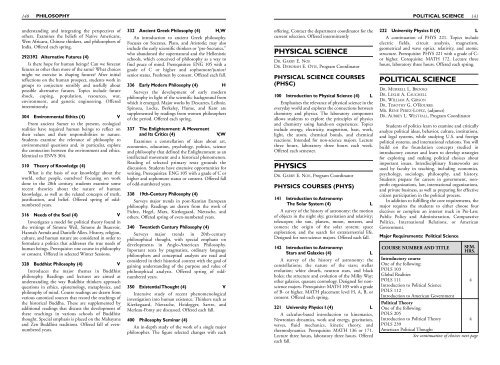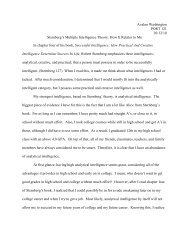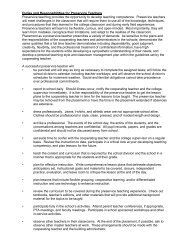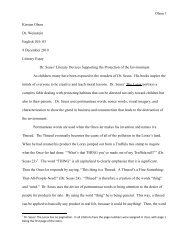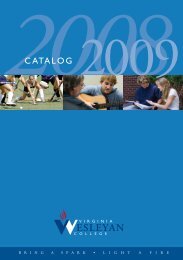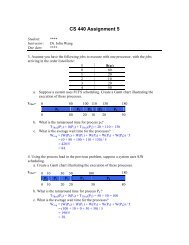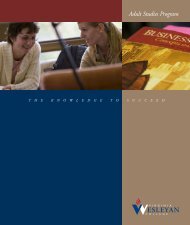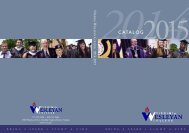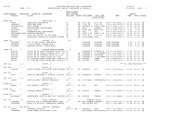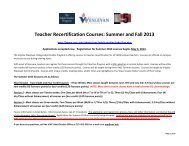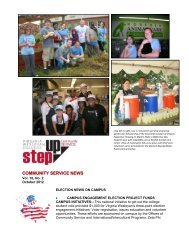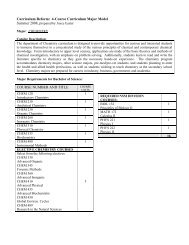2013-2014 Catalog - Virginia Wesleyan College
2013-2014 Catalog - Virginia Wesleyan College
2013-2014 Catalog - Virginia Wesleyan College
- No tags were found...
You also want an ePaper? Increase the reach of your titles
YUMPU automatically turns print PDFs into web optimized ePapers that Google loves.
140 PHILOSOPHYPOLITICAL SCIENCE141understanding and integrating the perspectives ofothers. Examines the beliefs of Native Americans,West Africans, Chinese thinkers, and philosophers ofIndia. Offered each spring.292/392 Alternative Futures (4)Is there hope for human beings? Can we forecastfutures as other than more of the same? What choicesmight we exercise in shaping futures? After initialreflections on the human prospect, students work ingroups to conjecture sensibly and usefully aboutpossible alternative futures. Topics include futureshock, coping, population, resources, war,environment, and genetic engineering. Offeredintermittently.304 Environmental Ethics (4) VFrom ancient Sumer to the present, ecologicalrealities have required human beings to reflect ontheir values and their responsibilities to nature.Students examine the relevance of philosophy toenvironmental questions and, in particular, explorethe connection between the environment and ethics.Identical to ENVS 304.310 Theory of Knowledge (4)What is the basis of our knowledge about theworld, other people, ourselves? Focusing on workdone in the 20th century, students examine somerecent theories about the nature of humanknowledge, as well as the related concepts of truth,justification, and belief. Offered spring of oddnumberedyears.316 Needs of the Soul (4) VInvestigates a model for political theory found inthe writings of Simone Weil, Simone de Beauvoir,Hannah Arendt and Danielle Allen. History, religion,culture, and human nature are considered in order toformulate a politics that addresses the true needs ofhuman beings. Prerequisite: one course in philosophyor consent. Offered in selected Winter Sessions.328 Buddhist Philosophy (4) VIntroduces the major themes in Buddhistphilosophy. Readings and lectures are aimed atunderstanding the way Buddhist thinkers approachquestions in ethics, epistemology, metaphysics, andphilosophy of mind. Course readings are drawn fromvarious canonical sources that record the teachings ofthe historical Buddha. These are supplemented byadditional readings that discuss the development ofthese teachings in various schools of Buddhistthought. Special emphasis is placed on the Mahayanaand Zen Buddhist traditions. Offered fall of evennumberedyears.332 Ancient Greek Philosophy (4) H,WAn introduction to ancient Greek philosophy.Focuses on Socrates, Plato, and Aristotle; may alsoinclude the early scientific thinkers or “pre-Socratics,”who abandoned the supernatural and the Hellenisticschools, which conceived of philosophy as a way tofind peace of mind. Prerequisites: ENG 105 with agrade of C or higher and sophomore/junior/senior status. Freshmen by consent. Offered each fall.336 Early Modern Philosophy (4) HSurveys the development of early modernphilosophy in light of the scientific background fromwhich it emerged. Major works by Descartes, Leibniz,Spinoza, Locke, Berkeley, Hume, and Kant aresupplemented by readings from women philosophersof the period. Offered each spring.337 The Enlightenment: A Movementand Its Critics (4)V,WExamines a constellation of ideas about art,economics, education, psychology, politics, scienceand philosophy that defined the Enlightenment as anintellectual movement and a historical phenomenon.Reading of selected primary texts grounds thediscussion. Students have extensive opportunities forwriting. Prerequisites: ENG 105 with a grade of C orhigher and sophomore status or consent. Offered fallof odd-numbered years.338 19th-Century Philosophy (4)Surveys major trends in post-Kantian Europeanphilosophy. Readings are drawn from the work ofFichte, Hegel, Marx, Kierkegaard, Nietzsche, andothers. Offered spring of even-numbered years.340 Twentieth Century Philosophy (4)Surveys major trends in 20th-centuryphilosophical thought, with special emphasis ondevelopments in Anglo-American Philosophy.Inportant texts by pragmatists, ordinary languagephilosophers and conceptual analysts are read andconsidered in their historical context with the goal ofgaining understanding of the purpose and value ofphilosophical analysis. Offered spring of oddnumberedyears.350 Existential Thought (4) VIntensive study of recent phenomenologicalinvestigation into human existence. Thinkers such asKierkegaard, Nietzsche, Heidegger, Sartre, andMerleau-Ponty are discussed. Offered each fall.400 Philosophy Seminar (4)An in-depth study of the work of a single majorphilosopher. The figure selected changes with eachoffering. Contact the department coordinator for thecurrent selection. Offered intermittentlyPHYSICAL SCIENCEDR. GARRY E. NOEDR. DEBORAH E. OTIS, Program CoordinatorPHYSICAL SCIENCE COURSES(PHSC)100 Introduction to Physical Science (4) LEmphasizes the relevance of physical science in theeveryday world and explores the connections betweenchemistry and physics. The laboratory componentallows students to explore the principles of physicsand chemistry using hands-on experiences. Topicsinclude energy, electricity, magnetism, heat, work,light, the atom, chemical bonds, and chemicalreactions. Intended for non-science majors. Lecturethree hours, laboratory three hours each week.Offered each semester.PHYSICSDR. GARRY E. NOE, Program CoordinatorPHYSICS COURSES (PHYS)141 Introduction to Astronomy:The Solar System (4)LA survey of the history of astronomy; the motionof objects in the night sky; gravitation and relativity;telescopes; the sun, planets, moon, meteors, andcomets; the origin of the solar system; spaceexploration; and the search for extraterrestrial life.Designed for non-science majors. Offered each fall.142 Introduction to Astronomy:Stars and Galaxies (4)LA survey of the history of astronomy; theconstellations; the nature of the stars; stellarevolution; white dwarfs, neutron stars, and blackholes; the structure and evolution of the Milky Way;other galaxies, quasars; cosmology. Designed for nonsciencemajors. Prerequisite: MATH 105 with a gradeof B- or higher, MATH placement level H, A, B, orconsent. Offered each spring.221 University Physics I (4) LA calculus-based introduction to kinematics,Newtonian dynamics, work and energy, gravitation,waves, fluid mechanics, kinetic theory, andthermodynamics. Prerequisite: MATH 136 or 171.Lecture three hours, laboratory three hours. Offeredeach fall.222 University Physics II (4) LA continuation of PHYS 221. Topics includeelectric fields, circuit analysis, magnetism,geometrical and wave optics, relativity, and atomicstructure. Prerequisite: PHYS 221 with a grade of C-or higher. Corequisite: MATH 172. Lecture threehours, laboratory three hours. Offered each spring.POLITICAL SCIENCEDR. MURRELL L. BROOKSDR. LESLIE A. CAUGHELLDR. WILLIAM A. GIBSONDR. TIMOTHY G. O’ROURKEMR. RENE PEREZ-LOPEZ, (adjunct)DR. AUBREY L. WESTFALL, Program CoordinatorStudents of politics learn to examine and criticallyanalyze political ideas, behavior, culture, institutions,and legal systems, while studying U.S. and foreignpolitical systems, and international relations. You willbuild on the foundation concepts studied inintroductory courses and learn to develop strategiesfor exploring and making political choices aboutimportant issues. Interdisciplinary frameworks areused by faculty in teaching, including economics,psychology, sociology, philosophy, and history.Students prepare for careers in government, nonprofitorganizations, law, international organizations,and private business, as well as preparing for effectivecitizen participation in the political process.In addition to fulfilling the core requirements, themajor requires the students to either choose fourelectives or complete an interest track in Pre-Law,Public Policy and Administration, ComparativePolitics, International Relations, or AmericanGovernment.Major Requirements: Political ScienceCOURSE NUMBER AND TITLE SEM.HRS.Introductory courseOne of the following:POLS 103Global RealitiesPOLS 111 4Introduction to Political SciencePOLS 112Introduction to American GovernmentPolitical TheoryOne of the following:POLS 205Introduction to Political Theory 4POLS 239American Political ThoughtSee continuation of choices next page


